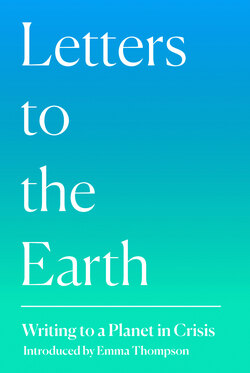Читать книгу Letters to the Earth - Группа авторов - Страница 7
Introduction
ОглавлениеAll humans know somewhere deep – somewhere like our spinal cords, somewhere we are not used to communicating with – that our planet is suffering. We know at a cellular level and it is causing us huge distress. It’s like being in a sci-fi story where we are under attack from the Martians – except in this story we are the Martians and there is no spaceship out there poised to save us from destruction. But let’s remember that because we are the authors of the story we can also be the authors of what comes next.
So many of our inventions – miraculous at the time – gas, coal, planes, cars, smoking (I loved it) are now the agents of destruction. It’s hard to let go of our addictions, so hard. But let go we must if we, and the greater web of life of which we are, after all, only a part, are to survive.
I wonder what the best way of helping us understand that is. The Intergovernmental Panel on Climate Change (IPCC) reports, the terrifying documentaries, the relentless roll-call of climate disasters spread fearfully essential knowledge and are vital, of course. It goes without saying that we must educate ourselves and see for ourselves what is taking place. But something else needs to happen if our fear and rage and frustration are to succeed in transforming our world.
These writings have pulled me back into focus.
I can remember now how many bees I used to see in parks and gardens in London and on the hills of Argyll. I can remember the variety of butterflies, their miraculous beauty, strength and fragility. I realise how little I now see them and how heartbroken it makes me. I miss them in the visceral way I miss members of my family long since dead.
We all need to plug into our love for our home, our planet, our earth. The astronauts describe it so well – those people with fiercely trained scientific minds who may not necessarily open themselves to poetic imagination (that might be too dangerous). They suddenly see the vulnerable beauty of our pale blue dot in the reaches of dark space. They feel huge love and empathy for it and, crucially, they feel deeply protective.
Art – in all its forms – can turn us all into astronauts. It can help us out of the prison of assumption and the caverns of ignorance into the atmosphere of clarity and hope. The temptation to panic is very great but panic will always prevent useful action. I panic regularly about the planet and then I will often turn to small, everyday actions. One of them is to sit and contemplate the beauty of nature – to go to a park and read and look up every so often at the sky or at a tree and remind myself that while we are here, we can care for our home.
Or I can transform my panic by joining larger actions – like the XR protest at Oxford Circus which was so memorable and full of love. Standing on the pink boat reading Jackie Morris’s exquisite, anguished lament to the swallow was an extraordinary experience. I looked out over so many faces – some people, overwhelmed with grief, wept openly. The police came and stood around us but the atmosphere was peculiarly peaceful. Public moments of sharing – particularly the sharing of art – change the spaces and alter the atmosphere. This can give us vital strength. We must engage in these acts because – make no mistake – the ruling powers will not do enough to alter the course of this terrifying history. We are on our own and together we will have to make them.
My vision is sometimes blurred by the horror of the millions of deaths our fossil fuel habits have caused and by the certain knowledge that all of this will continue to get worse until it gets better – because so much of what we have done is irreversible.
But in the end, hopelessness serves no purpose. Fighting for everything climate change reversal represents, from the essential bee to global social justice, will never offer anything but active hope.
We must combine the determined and unstoppable organisation of our best instincts with the vision of astronauts.
The wave of change is here. The generation below mine is different. I feel it and I read it in these letters. They know we have failed them and instead of wasting time blaming us or even trying to punish us they simply act. The young do not mind change as much as the old.
They are our best hope and listening to them always makes me feel powerful once again. Plugging into that energy will recharge even the most tired of batteries.
Read this book and pass it on. Hand on your passion for the planet to the next person and never, ever give in. Convert your rage to action and your grief to love. I think the planet feels us as we do this. Perhaps it will even help us.
Emma
